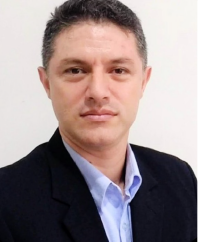Sergio Salinas

Degree
Ph.D. Student Department of Electrical and Computer Engineering
Research Project Focus
My research focuses on the application of mixed reality and wearable sensors in shoulder rehabilitation exercises.
Career Update
Transdisciplinary Research Award Winner
Research Title: Effects of Interaction Levels of a Mixed Reality Approach on Upper Limb Rehabilitation Performance Measured with Wearable Sensors.
- 2021: $10,000.00
Looking back...
My interest in musculoskeletal health began in 2010 while I was working as a lecturer at a university in my home country. During that time, I participated in a research project focused on developing an exoskeleton for lower limb rehabilitation. In this project, we designed and simulated a robotic system using gait data. Later, as a professor at another university, I worked on a prototype for a video game that was controlled through wireless sensors attached to a child’s orthosis.
In 2021, I began my Ph.D. program under the supervision of Dr. Ana Luisa Trejos, concentrating on upper limb rehabilitation. This research focus, along with my previous work, aligns well with the goals of the Bone and Joint Institute and the CMHR program. As a result, I decided to apply to be a trainee in this unique program.
Value of the BJI & CMHR research environment and support...
The CMHR program has consistently supported my research journey. It began with outstanding courses focused on musculoskeletal (MSK) research, followed by the transdisciplinary award and a variety of learning opportunities such as workshops, webinars, and Ivey seminars. However, what I value most is the chance to interact with experts and students from diverse disciplines. The feedback I have received from CMHR program members has greatly enhanced my knowledge and skills.
Through the Transdisciplinary Research Training Award, I have had the opportunity to collaborate with experts in various fields, including engineering, surgery, and rehabilitation. I also attended two international conferences where I presented and published two scientific papers related to my research. This award has provided financial support not only for me but also for my family.
My research focuses on the application of mixed reality and wearable sensors in shoulder rehabilitation exercises. This interdisciplinary approach has been essential in identifying the requirements of the mixed reality system based on patient needs, establishing protocols for conducting trials with participants, and defining clinically relevant goals for the research.
From an engineering perspective, I have had the honor of working with two supervisors: Dr. Ana Luisa Trejos, an expert in wearable mechatronics applied to upper body rehabilitation and motion assistance, and Dr. Katarina Grolinger, an expert in software engineering and data analytics. On the clinical side, I have received invaluable guidance from Dr. Marie-Eve LeBel, a specialist in the arthroscopic treatment of athletic injuries and disorders of the shoulder. Additionally, physiotherapists Catherine Lane, Tracy Elliott, and Kelly Schmitt from the Hand and Upper Limb Centre have taught me about the rehabilitation process, exercises, and patient needs.
Advice for current and future trainees...
I recommend making the most of the numerous opportunities offered by the program. In addition to the courses, you should take advantage of networking opportunities and extended learning experiences through workshops, seminars, and lectures. Additionally, you'll receive valuable feedback from experts in various areas of musculoskeletal health research.

